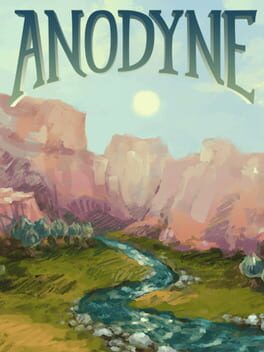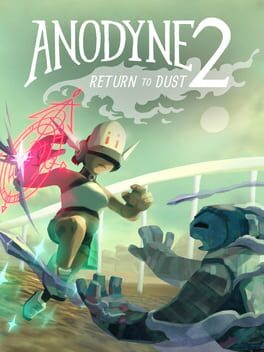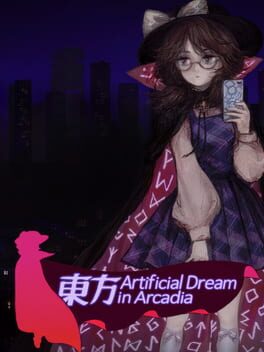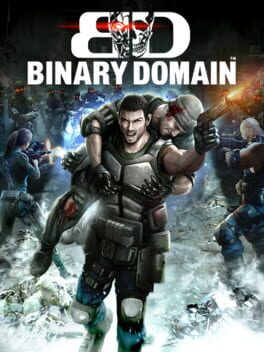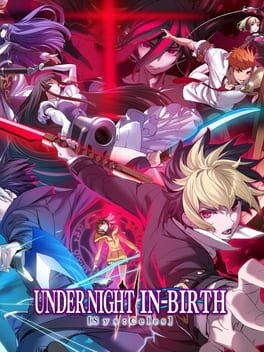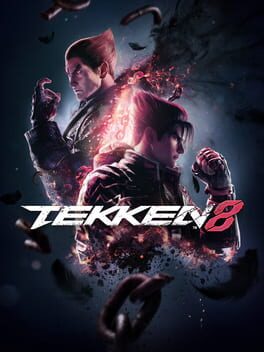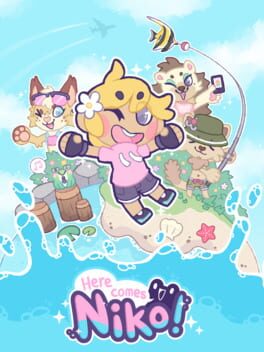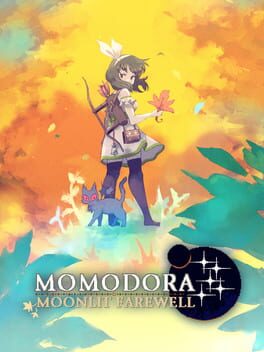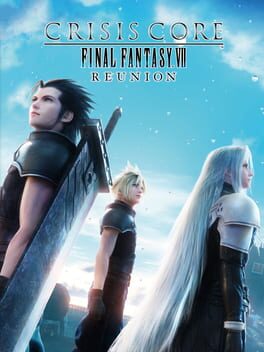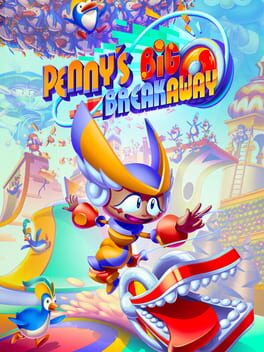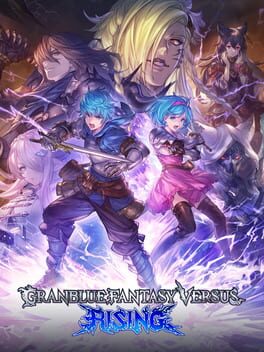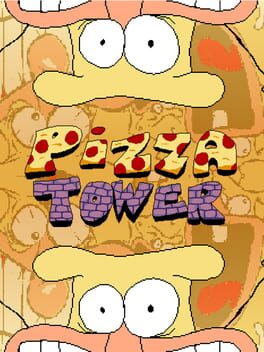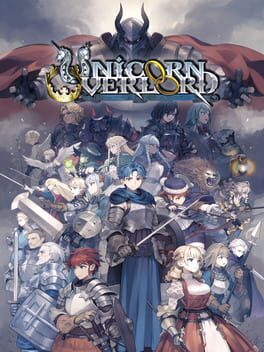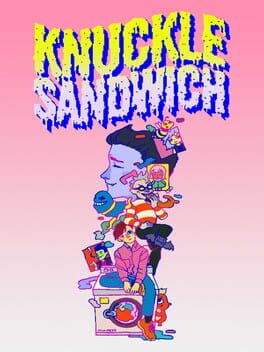Minerva's "Played in 2024" List
Thank you for checking out my 2024 media thread! I really appreciate you taking the time to see what I have to say about games I played this year :3
19 Games
Really ambitious game that unfortunately suffers from what it wants to be. It's too simple and otherwise the only reason you'd play this game is because of the eleventh hour twist. Otherwise, it's a fairly adequate Link's Awakening styled game.
Tries and succeeds at being much more than the original game. Going full 3D and re-contextualizing the "why" behind the original game's visuals. Story is a lot more meaningful than the original while still leaving a lot to the imagination.
One of the best SMT games I've played. With a lot of inspiration from Strange Journey and the SNES SMT games, Arcadia has a lot of mechanics exclusive to itself that Atlus SMT games could stand to learn from.
This game is really experimental, and I love it for that. I've never seen a Third Person Shooter with Social Links before, in addition to voice commands. I hope RGG ends up making something this unique again.
Infinite Wealth is at odds with itself.
There is so much that this game does well: dozen of gameplay tweaks on top of Like a Dragon's already good combat that make that game feel obsolete, little flourishes like the way Ichiban moves around feeling better than any previous game in the series or small stuff like how you can click on taxi stops right from the map instead of having to pull up a separate menu. There is so much good this game does, like how it has strong core theming and how the old cast is put under a new lens while the new cast is given time to shine. Honolulu is just as welcome to the series as Yokohama was when it dropped back in 2020, and in some ways, such as how it has roaming overworld bosses that drop weapon materials it's one of the finest crafted open worlds in the series.
In spite of IW's strengths, there are some crippling flaws I've found within that makes me love the game less than it's predecessor. The game is mostly well written, but there are critical plot point that don't stand up to scrutiny. The more you think about specific moments in the game, the less they end up making sense. Kiryu ends up taking the brunt of the focus in this game, which isn't inherently a problem. That being said, this game starts out as Ichiban's journey of self discovery: He starts the game high, falls to a new low because of a combination of his own childishness and background manipulation of the big bad. By the end of the story, Ichiban's growth is undermined at the eleventh hour and he doesn't even land the final hit on the person who got him into this whole situation. I'm torn on Kiryu being the focal point on a lot of this story, not because I'd rather he take the backstage, but because it comes at the cost of Ichiban having very little to do in this plot which was meant to be all about him.
While the gameplay is some of the best RPG gameplay ever, it struggles from some pretty major balancing issues. If you're on level with the major bosses you will never once struggle in this whole game, meanwhile if you're more than 5 levels below the boss you're fighting winning is almost impossible. There are two different points in which the game implies you should grind and if you don't, you'll quickly find yourself simply out damaged. As of writing there is not enough worthwhile content in the post-game. The day one DLC with the Big Swell Dungeon falls into the same trappings of the base game: simply be on level with your opponent and you'll never struggle. I found myself pre-emptively defense buffing and having regen up on my party but it never really mattered. I was able to clear the post game with ease, with all my characters around the 60s range, no jobs capped and not even having fully leveled ultimate weapons on all of my characters. I never game-over'd on any of the floors of Big Swell, and I wasn't even over-leveled. You could not say the same about Like a Dragon's True Final Millennium Tower, and my point is Infinite Wealth could desperately use some sort of hyper challenging content like that to really enforce how good the gameplay is.
In summary, I don't think the negatives outweigh the positives. This game is so good that I couldn't possibly hate it. However, I definitely love the game less because of it's myriad of flaws. Like a Dragon is one of my favorite games, and is exempt from how many issues Infinite Wealth has. As such, I see it as the better game in spite how how many improvements Infinite Wealth has over it's predecessor.
9/10: nearly perfect, yet flawed enough to affect how much I love it.
There is so much that this game does well: dozen of gameplay tweaks on top of Like a Dragon's already good combat that make that game feel obsolete, little flourishes like the way Ichiban moves around feeling better than any previous game in the series or small stuff like how you can click on taxi stops right from the map instead of having to pull up a separate menu. There is so much good this game does, like how it has strong core theming and how the old cast is put under a new lens while the new cast is given time to shine. Honolulu is just as welcome to the series as Yokohama was when it dropped back in 2020, and in some ways, such as how it has roaming overworld bosses that drop weapon materials it's one of the finest crafted open worlds in the series.
In spite of IW's strengths, there are some crippling flaws I've found within that makes me love the game less than it's predecessor. The game is mostly well written, but there are critical plot point that don't stand up to scrutiny. The more you think about specific moments in the game, the less they end up making sense. Kiryu ends up taking the brunt of the focus in this game, which isn't inherently a problem. That being said, this game starts out as Ichiban's journey of self discovery: He starts the game high, falls to a new low because of a combination of his own childishness and background manipulation of the big bad. By the end of the story, Ichiban's growth is undermined at the eleventh hour and he doesn't even land the final hit on the person who got him into this whole situation. I'm torn on Kiryu being the focal point on a lot of this story, not because I'd rather he take the backstage, but because it comes at the cost of Ichiban having very little to do in this plot which was meant to be all about him.
While the gameplay is some of the best RPG gameplay ever, it struggles from some pretty major balancing issues. If you're on level with the major bosses you will never once struggle in this whole game, meanwhile if you're more than 5 levels below the boss you're fighting winning is almost impossible. There are two different points in which the game implies you should grind and if you don't, you'll quickly find yourself simply out damaged. As of writing there is not enough worthwhile content in the post-game. The day one DLC with the Big Swell Dungeon falls into the same trappings of the base game: simply be on level with your opponent and you'll never struggle. I found myself pre-emptively defense buffing and having regen up on my party but it never really mattered. I was able to clear the post game with ease, with all my characters around the 60s range, no jobs capped and not even having fully leveled ultimate weapons on all of my characters. I never game-over'd on any of the floors of Big Swell, and I wasn't even over-leveled. You could not say the same about Like a Dragon's True Final Millennium Tower, and my point is Infinite Wealth could desperately use some sort of hyper challenging content like that to really enforce how good the gameplay is.
In summary, I don't think the negatives outweigh the positives. This game is so good that I couldn't possibly hate it. However, I definitely love the game less because of it's myriad of flaws. Like a Dragon is one of my favorite games, and is exempt from how many issues Infinite Wealth has. As such, I see it as the better game in spite how how many improvements Infinite Wealth has over it's predecessor.
9/10: nearly perfect, yet flawed enough to affect how much I love it.
The sheer spectacle and gravitas of Tekken 8 needs to be seen to be believed. While using the same gameplay that fans have loved for decades, and carrying on as the 8th game in an ongoing story, it's likely to win over even new players with how much hype every moment (story or otherwise) exudes from the screen.
A simple platformer with simply fun gameplay. I'd love to see more games do this sort of hubs-filled-with-mini-games style.
(Need more playtime)
While not perfect, the modern flourishes of Reload bring the story of Persona 3 to audiences who might not otherwise have tried it. There is a loss of nuance between the game's art direction being over-saturated, or the fact that the AI tactics system of the original is nowhere to be seen, but put simply; there is no such thing as the "definitive" version of Persona 3. In spite of it being the Persona game with the highest amount of different editions there is no one version that perfectly satisfies everyone as a sheer upgrade. Reload is simply another version of Persona 3, on top of the other three that already exist, with present day sensibilities and an attempt to keep in tact some of what made the PS2 original special. For others, that might be enough to berate Reload but for me it's simply a new release of a game I already love.
Final Fantasy VII is truly a paramount game of it's time.
While keeping the established formula of gameplay and narrative pacing from the SNES era Final Fantasy games, FFVII manages to encapsulate everything that made the Super Nintendo games so fantastic and then some. The Materia system, while simple on it's surface manages to surpass the Magicite system from FFVI. Where that game lead to all of the characters becoming homogenized spell casters (sans characters like Edgar and Setzer with unique equipment that helps them in the late game) and Final Fantasy V where at the very end game Freelance and Mime become objectively the best jobs, FFVII starts with every character roughly being homogeneous and gradually leads to characters branching out into archetypes of your choosing as you progress the game. Through the Materia system FFVII manages to give the player upmost freedom when it comes to what type of characters they have in their party. Want Cloud to be a body guard who protects his teammates and counters when he does so? Go for it! Want Tifa to fully invest in summoning? Sure, why not? Want to completely tear the game open with stuff like Enemy Skill and X-Cut? You're free to. My point is, while I may like aspects of V and VI's gameplay more FFVII's gameplay leaves a lot more in the players hand with more freedom. In addition to Materia, Final Fantasy VII also revolutionized the JRPG genre with the Limit Break mechanic.
It's not perfect, however. A lot of Materia, like the first Enemy Skill and most of the Summon Materia are missable forever which can be really punishing to a new player just getting their baring. That, and Materia is naturally limited based on the fact that FFVII is a PS1 game, in the same ways that the SNES and NES Final Fantasy games are also limited by the consoles they're on. In spite of that, FFVII's gameplay is a whole lot of fun, and it's downsides are really not that big of a deal.
In terms of gameplay, each character is primarily differentiated by what Limit Break they can use when they're damaged enough. Inspired by Final Fantasy VI's "Desperation Attack" system, Limit Breaks are unique actions each party member gets to use once they've taken enough damage. Cloud's are simple utility attacks, Tifa gets a slot machine mini game, Cait Sith gets a dice game, Aerith has healing and utility Limit Breaks and Vincent's turns him into various different Berserker beasts. While there's not much to differentiate characters besides their weapon type, base stats and what their Limit Break does, the Limit Break system adds a lot to each character through the simple act of doing different things per character and filling up quick enough to be used all the time. The one big downside with the system is how you lose access to the "Attack" command once your LB fills meaning the game enforces you to use it right then and there, or have a waste of a character slot until you find an enemy worth using it on.
It's formula might be following the games that came before it, there are two ways I feel Final Fantasy VII is unmatched even today: It's characters and it's central themes. While Tetsuya Nomura worked previously on both FFV and FFVI, his work in Final Fantasy VII is doubtless the single most influential thing he has ever created. Every single character in Final Fantasy VII is so masterfully designed. It's like each character started as a base idea and managed to effortlessly convey that idea through how they look alone. Tetsuya Nomura has gone on record as stating that Cloud and Sephiroth are based on Miyamoto Musashi and Sasaki Kojiro, and that Sephiroth in particular was meant to invoke the very idea of cool. I think time has stood to prove Nomura's intent successful. The character design is so potent, often times it works it ways into the themes without even trying. The primary theme of Final Fantasy VII is "identity". That theme is carried through every single character in the story. Cloud is lying to himself about his identity; he's taking the role of the man who died so he could live. Dressed as a Shinra Soldier, he tries to convince himself that he's someone he's not. Through the game, he discovers himself which leads to him actively changing how he acts around the people he's grown close to during their journey, the people who are still there for him. Every character has an arc that is evocative of their identity, which ties back to their character design in some way or another. Barret acts as a militant eco-terrorist leader but realizes it was mostly a facade so he could deal with the guilt over how he lost his arm, Red XIII lies about his maturity in order to make sure he's seen as equal to the rest of the party and his XIII tattoo ties him back to his time as Hojo's lab experiment, even Sephiroth has a crisis of identity which acts as the catalyst for the whole story. As a central theme, identity in FFVII is very omnipresent and very well thought out. It's something Final Fantasy games before and after haven't matched.
Just about every aspect of this game is iconic: It's story, characters, gameplay, music, mini-games, it's localization (for the worse), it's sound effects and UX. Everything in this game is very popular, and it's all for good reason. The only thing Final Fantasy VII does poorly is it's graphics, and even then they're harmless and passable through the view of a CRT. This is genuinely a game that everyone should at some point try (as long as you're using a fan translation)
While keeping the established formula of gameplay and narrative pacing from the SNES era Final Fantasy games, FFVII manages to encapsulate everything that made the Super Nintendo games so fantastic and then some. The Materia system, while simple on it's surface manages to surpass the Magicite system from FFVI. Where that game lead to all of the characters becoming homogenized spell casters (sans characters like Edgar and Setzer with unique equipment that helps them in the late game) and Final Fantasy V where at the very end game Freelance and Mime become objectively the best jobs, FFVII starts with every character roughly being homogeneous and gradually leads to characters branching out into archetypes of your choosing as you progress the game. Through the Materia system FFVII manages to give the player upmost freedom when it comes to what type of characters they have in their party. Want Cloud to be a body guard who protects his teammates and counters when he does so? Go for it! Want Tifa to fully invest in summoning? Sure, why not? Want to completely tear the game open with stuff like Enemy Skill and X-Cut? You're free to. My point is, while I may like aspects of V and VI's gameplay more FFVII's gameplay leaves a lot more in the players hand with more freedom. In addition to Materia, Final Fantasy VII also revolutionized the JRPG genre with the Limit Break mechanic.
It's not perfect, however. A lot of Materia, like the first Enemy Skill and most of the Summon Materia are missable forever which can be really punishing to a new player just getting their baring. That, and Materia is naturally limited based on the fact that FFVII is a PS1 game, in the same ways that the SNES and NES Final Fantasy games are also limited by the consoles they're on. In spite of that, FFVII's gameplay is a whole lot of fun, and it's downsides are really not that big of a deal.
In terms of gameplay, each character is primarily differentiated by what Limit Break they can use when they're damaged enough. Inspired by Final Fantasy VI's "Desperation Attack" system, Limit Breaks are unique actions each party member gets to use once they've taken enough damage. Cloud's are simple utility attacks, Tifa gets a slot machine mini game, Cait Sith gets a dice game, Aerith has healing and utility Limit Breaks and Vincent's turns him into various different Berserker beasts. While there's not much to differentiate characters besides their weapon type, base stats and what their Limit Break does, the Limit Break system adds a lot to each character through the simple act of doing different things per character and filling up quick enough to be used all the time. The one big downside with the system is how you lose access to the "Attack" command once your LB fills meaning the game enforces you to use it right then and there, or have a waste of a character slot until you find an enemy worth using it on.
It's formula might be following the games that came before it, there are two ways I feel Final Fantasy VII is unmatched even today: It's characters and it's central themes. While Tetsuya Nomura worked previously on both FFV and FFVI, his work in Final Fantasy VII is doubtless the single most influential thing he has ever created. Every single character in Final Fantasy VII is so masterfully designed. It's like each character started as a base idea and managed to effortlessly convey that idea through how they look alone. Tetsuya Nomura has gone on record as stating that Cloud and Sephiroth are based on Miyamoto Musashi and Sasaki Kojiro, and that Sephiroth in particular was meant to invoke the very idea of cool. I think time has stood to prove Nomura's intent successful. The character design is so potent, often times it works it ways into the themes without even trying. The primary theme of Final Fantasy VII is "identity". That theme is carried through every single character in the story. Cloud is lying to himself about his identity; he's taking the role of the man who died so he could live. Dressed as a Shinra Soldier, he tries to convince himself that he's someone he's not. Through the game, he discovers himself which leads to him actively changing how he acts around the people he's grown close to during their journey, the people who are still there for him. Every character has an arc that is evocative of their identity, which ties back to their character design in some way or another. Barret acts as a militant eco-terrorist leader but realizes it was mostly a facade so he could deal with the guilt over how he lost his arm, Red XIII lies about his maturity in order to make sure he's seen as equal to the rest of the party and his XIII tattoo ties him back to his time as Hojo's lab experiment, even Sephiroth has a crisis of identity which acts as the catalyst for the whole story. As a central theme, identity in FFVII is very omnipresent and very well thought out. It's something Final Fantasy games before and after haven't matched.
Just about every aspect of this game is iconic: It's story, characters, gameplay, music, mini-games, it's localization (for the worse), it's sound effects and UX. Everything in this game is very popular, and it's all for good reason. The only thing Final Fantasy VII does poorly is it's graphics, and even then they're harmless and passable through the view of a CRT. This is genuinely a game that everyone should at some point try (as long as you're using a fan translation)
Much in the same vein as Final Fantasy VII Remake, the modus operandi of Rebirth is to make the world of SquareSoft's 1997 original bigger in every conceivable way. Every set-piece, every area, every sectioned off corner of the world of the original game is much larger scale in Rebirth. The difference in presentation from the original game attempts to entrust more personality onto this game than the PS1 game ever had. From locales, the characters and enemies to even the music. The goal of Final Fantasy VII Rebirth is to try to convince you that the world of Final Fantasy VII is one worth loving; That the people within it are worth cherishing and that those whose fight against it are truly deplorable. Rebirth succeeds in hammering this point in even harder than the FFVII Remake while using the same techniques, the same flair and the same sheer hype enduing spectacle of that game. In so many words, if you liked Final Fantasy VII Remake you're sure to like Rebirth.
Fun yet flawed. Penny's Big Breakaway focuses heavily on score attack without questioning what makes score attack fun to begin with. Without a time limit, you're able to farm for score forever with a multiplier that's equally easy to maintain as you effortlessly chain tricks together in an endless repetition, the only thing even attempting to stand in your way being the level design itself. The gameplay and visual uniqueness deserve better.
(Need more playtime)
